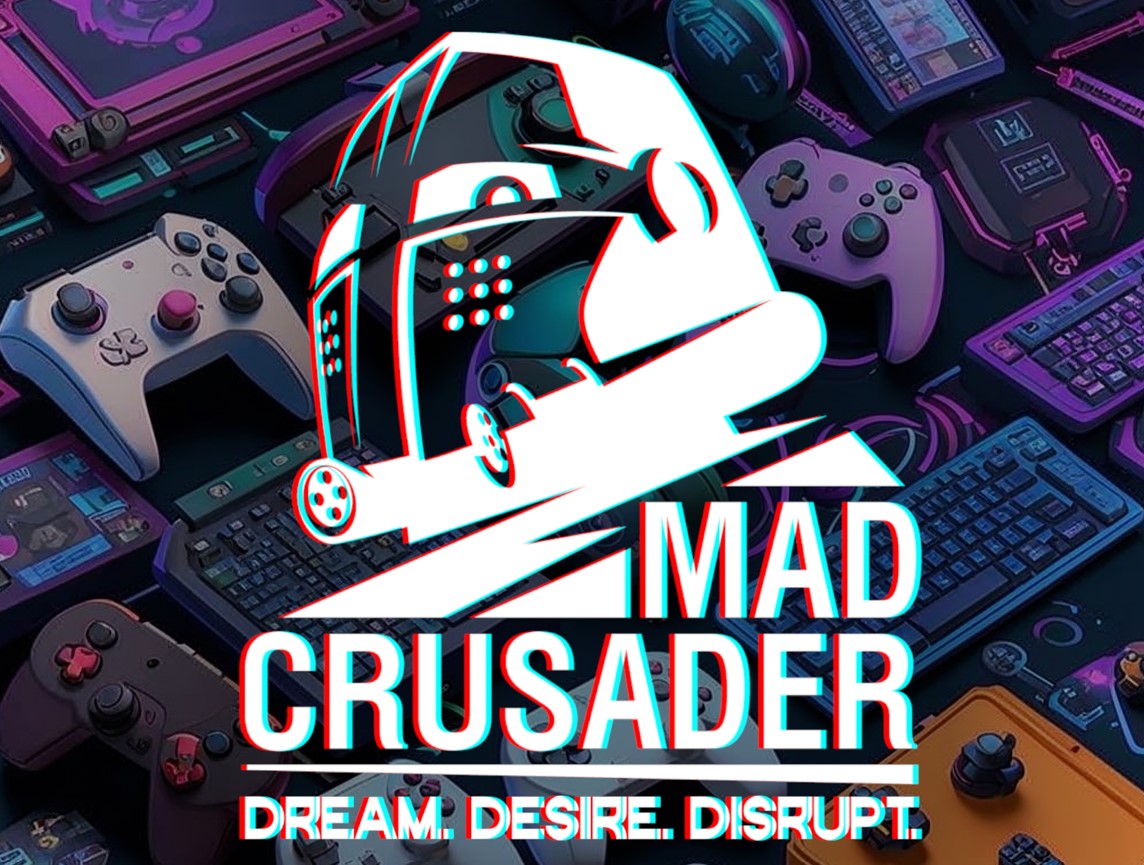Mad Crusader’s Yarr Rash speaks to the Cyprus Mail about turning ideas into global IPs
Following the recent announcement of a €30 million investment in premium AA games by Mad Crusader, a Cyprus-based IP incubator, the Cyprus Mail sat down with founder and CEO Yarr Rash to explore the company’s vision.
As a leading innovator in the gaming world, Rash shed light on how Mad Crusader’s unique approach to IP development and cross-media franchise creation sets them apart.
Based in Cyprus, Mad Crusader leverages the island’s growing reputation as a regional hub for video game development, blending passion, creativity, and structured mentorship to cultivate the next generation of entertainment IP creators.

CM: Mad Crusader is based in Cyprus. What advantages does Cyprus offer for your incubator, and how does the local environment influence your work?
YR: Cyprus is a global hub for game development and publishing. The region is favoured by innovators in video games and experts in IP management. We champion a unique approach to designing, developing, and publishing games, scaling them into cross-media IPs.
Being located in Cyprus allows us to tap into a rich pool of expertise and potential synergies. I, along with most of Mad Crusader’s co-founders, have lived and worked in Cyprus for several years. We’ve developed a personal and emotional connection to this beautiful island—the birthplace of Aphrodite.
CM: Your programme has been described as an “MBA for creators.” Could you elaborate on the unique elements of this programme that differentiate it from other game development and IP creation courses?
YR: In essence, we are a video game publisher. We just do everything (design, development, publishing) differently in every way.
We target the Geek audience, which has been making a lot of people rich since the late 1970s. If you look at the top 100 movies on IMDB, 56 of them (and 90 of the top 100 games on Metacritic) are aimed at Geeks.
We’ve identified 12 key settings that consistently resonate with this audience, and we’ve reverse-engineered them. What we do is form batches of up to 12 new IPs, each aligned with one of these 12 favourite settings. We develop and release these IPs simultaneously. We then offer IP Directors, investors, and partners rights at both the franchise and product levels.
This structured approach motivates everyone involved to establish the initial products as long-lasting IPs while also reducing investment risks.
Our training programme is one of three steps to make the Structured Franchise Portfolio approach work. We actively scout out creative individuals who are passionate about video games and geek culture. Individuals who haven’t yet started their own projects—though they definitely could with the right inspiration and support.
We offer them a free 8-month incubation programme to help them become IP Directors. The tools to turn their ideas into New IP concepts with cross-media franchise potential. We start by asking, ‘What if this IP is a success?’ and from there, we embed cross-media scaling potential right in the design phase using a unique 15-step framework.
By the time they graduate, each New IP concept includes a franchise and its first product design, along with all the necessary business documentation. From approach to methodology to results – there’s nothing like this programme out there. It matches a masters degree in IP and entertainment product management in intensity, but everything else is unique. And given the specifics of the audiences it is extremely personalised. The most promising creative talent tends to be the least likely to choose formal and generalized programmes.
The second step is production. We raise funds to finance the development of these designed IP concepts. To minimise risk, we limit the scope and budget of each initial product to a AA premium PC game. We set portfolio-wide milestones and deadlines, and we connect IP Directors and their New IPs with proven content production partners. On top of that, we provide a full-time production vetting process to ensure everything stays on track.
Finally, we move on to publishing and scaling. We intentionally limit marketing budgets to spark Go-to-Market creativity. We oversee and coordinate marketing efforts across the entire portfolio. We secure better deals with creative and media agencies at the portfolio level. And as these IPs hit the market, we continue to develop them through additional investment and cross-media licensing.

CM: With Mad Crusader’s significant investment in new IPs, how do you plan to mitigate the risks associated with launching fresh franchises in an industry that often favours established ones?
YR: Every investment in a new IP is, at its core, an invitation to take a leap of faith. In essence, the investor is asked to believe that ‘somebody has a great idea and will deliver it as a high-quality commercial product.’ Which is hard to believe, even if you wanted to. We transform this coin-toss scenario into three manageable risks.
First, we ensure that ‘somebody talented’ is a naturally gifted individual. Someone who has completed an 8-month programme in entertainment IP design and management. Something matching the intensity of a university master’s programme and exceeding it in results.
Second, we turn ‘a great idea’ into a well-structured New IP concept. A concept designed with audience desires, the competitive landscape, and business goals in mind. An idea with the potential for cross-media and cross-cultural scalability embedded from the design stage.
Finally, we collaborate with professional content development partners who have a proven track record of delivering high-quality entertainment products. We train our residents to work seamlessly with production teams. We also provide a continuous vetting process, instead of pretending that anyone can develop a quality product in their kitchen with friends, given sufficient funds.
CM: Mad Crusader’s first batch of the Game IP Incubation Programme graduated 10 participants with diverse IP concepts. Can you share any specific success stories or standout projects from this group?
YR: There are a few common threads in our first batch: all our residents are passionate about games and geek culture. They come from a diverse range of professional backgrounds. We have writers, programmers, marketers, accountants, content creators, designers, artists, business analysts, project managers, political campaigners, and community representatives. Industry professionals who attend our demo days consistently recognise the quality and scale of the fictional worlds and player experiences our residents design. They see their deep understanding of audience expectations and the competitive landscape are world class. This sets them far apart from the feature obsession that you would normally see in an incubation and acceleration programme. By the end of the year, we’ll be making product-specific announcements that will be hard to miss.
CM: You have a robust team with extensive experience from companies like EA and Wargaming. How does this collective expertise influence the mentorship and guidance offered to participants in your programme?
YR: To put it short – at every stage of our game and IP development lifecycle. From ideation to post-release scaling, we have a no-BS industry professional with at least 15 years of hands-on experience in the field. Instead of embarking on the impossible task of turning everyone into a businessman, our goal is to provide our IP directors with 360’ support and coaching every step of the way.
CM: What is your long-term vision for Mad Crusader, especially in terms of how you see the company shaping the future of the global entertainment industry?
YR: The AI era is here. While doomsday scenarios and tech singularities make for interesting conversations, the real story is how AI is changing the way we create content. Just like the industrial revolution did for manufacturing, content is now cheaper, faster, and easier to produce. Distribution channels are multiplying and constantly evolving.
In this landscape, the most valuable asset is a cross-media franchise; A fictional universe that can be turned into commercial entertainment products across multiple media types.
To be a major player in this new world, you need to own cross-media franchises (a privilege for 0.1 per cent of companies). If you don’t have them, you need to buy them (another 0.1 per cent) or create new IPs with cross-media franchise potential (the remaining 99.8 per cent).
Creating new IP requires three types of people: marketeers (who sell), engineers (who build), and visionaries (who see stuff). You can easily find trained engineers, sometimes trained marketers. But there’s no such thing as trained visionaries.
We already proved that you can produce trained visionaries, if you do the talent acquisition and training together with new IP concept design differently. Regardless of the participants’ location.
Over the next two years, we’ll demonstrate that our development and publishing approach works. From that point forward, our New IP Factory will operate at full scale. Our frameworks and methodologies will be adopted by mainstream education, nonprofit and governmental creative-economy initiatives, and any entertainment company with ambitions beyond being just a pixel producer competing with AI.







Click here to change your cookie preferences